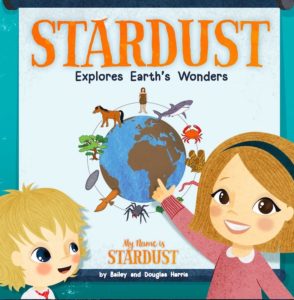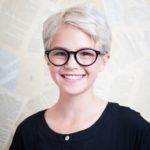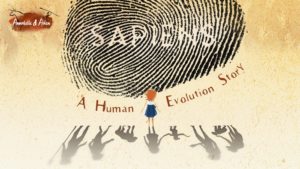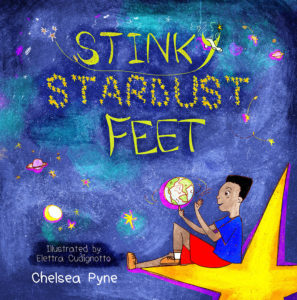Humanist EDge: Three New Books Make Evolution Fun For Kids

As Project Blitz pushes creationism, Bible studies, and the posting of “In God We Trust” signs in public schools (in order “to protect the free exercise of traditional Judeo-Christian religious values and beliefs in the public square”), three secular authors have taken on the need for real science education. Inspired by children’s natural curiosity to understand the world around them, these authors have developed fact-filled, beautiful picture books with charming characters in order to teach evolution.
Stardust Explores Earth’s Wonders by Bailey and Douglas Harris (for readers age five to ten)
In 2014, eight-year-old Bailey Harris’s love of science sparked the idea that would later manifest into a book series centered around “the wide-eyed, science-loving heroine,” Stardust. “When I learned from Cosmos that everything in our world is made of stars that exploded over billions of years, I wanted to share this with everyone!” she explains. “This concept helped me feel a connection to everything around me.” Co-writing with her father Douglas and with advisement from a group of scientists, the now thirteen-year-old will soon publish her third book, Stardust Explores Earth’s Wonders. It uses evidence-based reasoning and real-world examples to explain how everything on Earth is related.

Baily Harris
“Evolution isn’t easy to explain to children, but it’s so important for people to understand as they study any area of science,” Harris says. “We introduce a few of the fun, simple evolutionary facts in our first book, such as Tiktaalik, Lucy, and Purgatorious. Parents let us know that they really liked this and that they would like us to do more. So, we dedicated our third book to helping parents teach evolution to children.”
Dr. William Eric Meikle, former project director at the National Center for Science Education, suggested Bailey and her dad introduce a skeptical younger brother in the latest installment to bring up more questions. A discussion forms between this new character, Vincent, and Stardust throughout their journey:
Vincent: Where did plants and animals come from? Was it magic?
Stardust: No, it wasn’t magic. But the process is even more special than magic.
Along with her writing, Bailey Harris founded the first middle school chapter of the Secular Student Alliance, while her older brothers started a chapter at their high school. “We’ll be doing some very fun things together this next year and I can’t wait to continue working with them to create a safe community for secular students around the country,” She says. Growing up in Utah as an atheist and advocate for science education and freethought, Harris has had peers push her to accept Mormonism, but notes she’s not a fan of religion. “My parents teach our family humanist values, and I think that this is a very positive way to talk about how and why we are good people.”
 Annabelle & Aiden: Sapiens: Our Human Evolution by JR Becker (age four to ten)
Annabelle & Aiden: Sapiens: Our Human Evolution by JR Becker (age four to ten)
Attorney JR Becker began his Annabelle & Aiden book series to provide his children, on whom the characters are based, with stories that would satisfy their curiosities and cultivate a thirst for knowledge. Becker’s research has led him to absorb countless books and podcasts on human anthropology, ancestry, evolution, and evolutionary psychology, as well as consult with scientists. Becker’s first book, Annabelle & Aiden: The Story of Life, features an owl teaching the protagonists about Darwin and evolution. The latest in the series, Sapiens: Our Human Evolution, dives deeper in an effort to address the huge gap Becker found in children’s literature in the area of evolution. As he says, “Why should us adults get all the good stuff, right?”

JR Becker
As he shared in a presentation at the American Humanist Association’s 2018 conference, Becker grew up in an Orthodox Jewish home in Baltimore, Maryland. Though warm and loving, his parents were extremely religious. As a young husband married into the faith, he recalled attending “a Rabbi’s speech on rational proofs for Judaism that sent me down a five-year-long rabbit hole of deep inquiry.” Today he says he’s an atheist and secular humanist “trying to keep my sanity and humor in a religious community. My pro-science, humanist books are one way I do that, with the support of many friends and family, both secular and religious.”
In Sapiens: Our Human Evolution, Becker transforms his research into rhyming poetic verses as readers follow Annabelle and Aiden on an adventure to understand how people are different and similar. He also provides additional facts in the background, all of which is illustrated by Max Rambaldi.
 Stinky Stardust Feet by Chelsea Pyne (age ten and up)
Stinky Stardust Feet by Chelsea Pyne (age ten and up)
In Stinky Stardust Feet, Chelsea Pyne introduces readers to Judas, a skeptical kid with lots of questions about life. An invisible narrator chimes in to teach him and occasionally play devil’s advocate, encouraging Judas to think critically and independently. When Pyne did some market research to see how Christians would respond to the name Judas, she found that most were intrigued and assumed he would be a character of betrayal. Pyne explains, “He is challenging authority and looking for evidence over claims. Also, he evolves throughout the book. His character literally develops the more he learns.”
Pyne was driven to write this book (and develop the corresponding website) due to concerns that science education was lacking and that topics like evolution and the Big Bang were underrepresented in early education. Along with reading science books, Pyne loves to learn through experience, especially in her work with a nature foundation in the Caribbean. “We are re-growing the corals from post hurricane devastation,” she reports. “I know I’ll never be a scientist, but I want to encourage kids to develop that curiosity around science from an early age.”

Chelsea Pyne
Pyne grew up Catholic in North Carolina, enjoyed Young Life and other Bible study groups, and attended Catholic school until the second grade when her parents agreed to let her attend public school. Her family stopped attending church after she graduated middle school but it wasn’t until after college that her thinking changed. “It took a lot of traveling and atheist friends to challenge my beliefs. Now I identify as an atheist. And I’d love to get more involved with secular/humanist groups.”
As humanists, we “seek to understand the universe by using science and its methods of critical inquiry—logical reasoning, empirical evidence, and skeptical evaluation of conjectures and conclusions—to obtain reliable knowledge.” These authors have poured their knowledge and their passion for science into an artistic medium to empower children to ask questions, seek answers, and strive to understand complex ideas throughout life. This is the kind of education that we need in our homes and schools.
